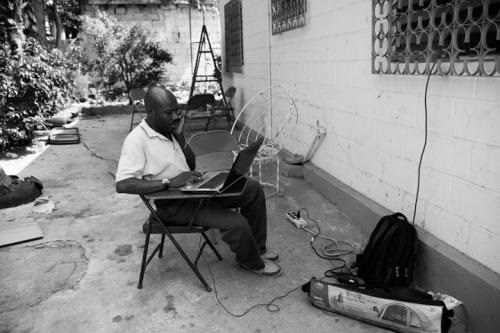
On the last day of his life, popular radio advocate Sony Estéus was to attend the opening of Voice of Ile-à-Vâche Community Radio (Radio VKI by its Creole acronym), the newest in an expanding network of grassroots stations throughout Haiti. Sony had worked with farmers and fishermen on the island of Ile-à-Vâche for seven years to establish the station.
On March 1, 2015, instead, the 50-year-old Sony died from as-yet-unknown causes.
Those who are part of progressive movements in Haiti, aiming for restoration of democracy, the defense of land in the face of multinational extraction, a redistribution of Haiti’s grossly unequal resources, women’s rights, and other essentials to a just society, remain shaken from the loss of Sony and the number of social-change agendas that are impacted by his passing. “Sony was involved in everything we are working for,” said Rosnel Jean-Baptiste, national co-coordinator of Heads Together Small Peasant Producers of Haiti.
Sony was a journalist and director of the Port-au-Prince-based Society for Social Animation and Communication (SAKS). SAKS helps popular and community radio stations, especially rural ones, get started and run. In a country where just over half of the population of those 15 and older is illiterate, radio is of paramount importance in the sharing of news and analysis, and the inclusion of marginalized perspectives. In addition to providing training and technical support on every element of managing a station and producing news, SAKS also provides weekly programs on critical topics not otherwise covered in the mainstream press – many of them produced by Sony – which the stations air.
Beyond radio itself, a second pillar in what Sony called “democratizing communication” is promotion of the Creole language. Sony was heartily committed to spreading the use of Creole, the only language spoken by 90% of the population.[1] French, which was for centuries the official language and the only one used by state, church, school, and business, has excluded the great majority from participating in political and economic realms, and in benefiting from them.
Sony was also a board member of the World Association of Community Radio Broadcasters (AMARC), whose members number more than 4,000 stations and networks in more than 150 countries.
In an interview with Sony that Other Worlds conducted three weeks after the earthquake of January 12, 2010, he said, “We’re working to give speech to the most excluded. Community and popular radio is playing a big role in isolated areas that have no information, or only information from the same political class and bourgeois civil society. Alternative information is being emitted especially from youth these days. Many of them can’t go to school [since their schools were destroyed] and so they’re going out to the countryside, participating in community radio and doing consciousness-raising. We’re also addressing issues that [mainstream] radio isn’t dealing with: environmental protection, human rights, women’s rights, children’s rights.
“For us, community and popular radio isn’t an end in itself. It’s part of a global plan of social change, of transformation of the society. We’re going to continue to do popular education to change the mentality and behavior of people, as well as to denounce what’s being done against them. As we move forward, we want to help people understand how to organize themselves and also how to fight the projects now underway which are going to reinforce their poverty.”
As for the nascent Voice of Ile-à-Vâche Community Radio, local activist Jean Matulnes Lamy said, “Sony helped so many communities use radio as a tool for information, consciousness-raising, training, and strength. Sony died, but he remains alive in every corner of the nation where people now have the chance to have their voices heard through radio.”
Lwanj pou ou, Sony. Honor to you, Sony.
Beverly Bell has worked for more than three decades as an advocate, organizer, and writer in collaboration with social movements in Latin America, the Caribbean, Africa, and the U.S. Her focus areas are just economies, democratic participation, and gender justice. Beverly currently serves as associate fellow at the Institute for Policy Studiesand coordinator of Other Worlds. She is author of Walking on Fire: Haitian Women Stories of Survival and Resistance, Fault Lines: Views Across Haiti’s Divide, and Harvesting Justice: Transforming Food, Land, and Agricultural Systems in the Americas.
[1] Figure provided to author by Creole linguist and researcher Yves Dejean.
